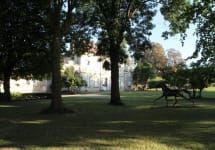Chateau Mangot 2020
-
Robert
Parker - Decanter
-
James
Suckling -
Jeb
Dunnuck
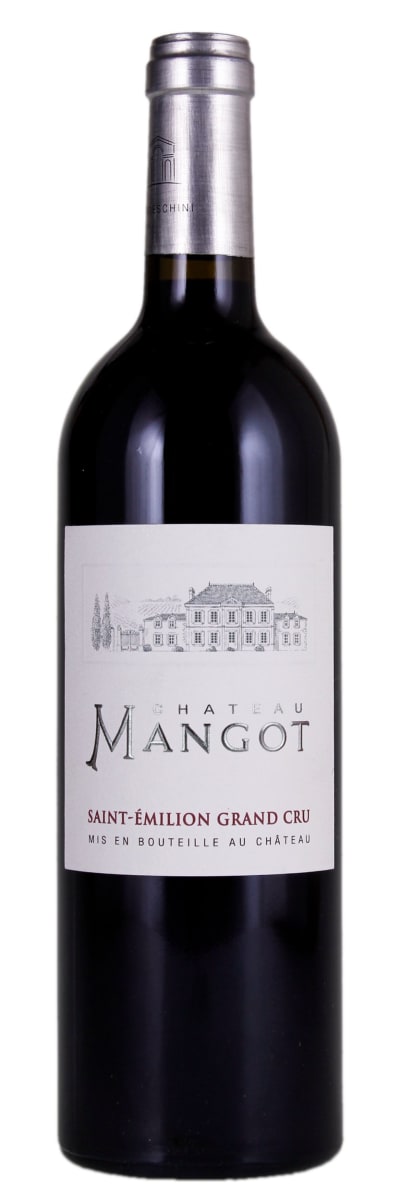


Product Details
Your Rating
Somm Note
Winemaker Notes
This cru, from the St Emilion Grand Cru appellation, is a faithful portrait of our 4 terroirs spread between the foot of the slopes, slopes, terraces and plateaux. The blend is also representative of the 21 plots that make up our vineyards. After tasting the grapes, we harvest them plot by plot according to grape variety, but also and above all according to terroir, altitude, exposure and age of the vines.
Blend: 80% Merlot, 15% Cabernet Franc and 5% Cabernet Sauvignon
Organically grown
Professional Ratings
-
Robert Parker's Wine Advocate
The 2020 Mangot has turned out beautifully, bursting with aromas of cherries, wild berries, rose petals, blood orange and bay leaf. Medium to full-bodied, supple and seamless, it's pure and vibrant, with a layered core of fruit, velvety tannins and a long, mouthwateringly chalky finish. This is a brilliant wine that sells for a song and which surpasses many of its more well-known neighbors.
-
Decanter
Bright plum colors full of flesh and bright fruits. Muscular on the attack, with poise and focus, and pulsating with blueberry fruits and saline-drenched minerality. Good stuff, enjoyable and impressively balanced with a grilled, smoked rosemary finish. 20% new oak, 30% amphora. Freres Todeschini are the owners here.
Barrel Sample: 94 -
James Suckling
A firm and linear red with plum, bark, wet earth and mushroom aromas and flavors. Hazelnuts. Medium-bodied with chewy tannins that are integrated and together. Real St.-Emilion.
-
Jeb Dunnuck
Emerging from a beautiful vineyard on the eastern side of the appellation and 75% Merlot, 20% Cabernet Franc, and the rest Cabernet Sauvignon, the 2020 Château Mangot offers a classy, medium to full-bodied, textured yet elegant style to go with complex notes of bouquet garni, scorched earth, violets, and leafy herbs. With beautiful fruit (cassis/black cherries), ripe, polished tannins, and outstanding length, I see no reason it would not offer pleasure in its youth yet also cruise for 15-20 years in cold cellars.
Barrel Sample: 90-92
Other Vintages
2024-
James
Suckling - Vinous
-
Robert
Parker
-
Robert
Parker -
James
Suckling
-
Robert
Parker -
James
Suckling -
Jeb
Dunnuck - Decanter
-
Robert
Parker -
James
Suckling
-
Robert
Parker -
James
Suckling -
Jeb
Dunnuck
-
Robert
Parker -
James
Suckling -
Jeb
Dunnuck
-
James
Suckling -
Wine
Enthusiast - Decanter

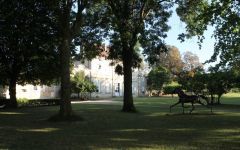
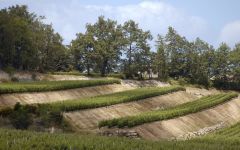
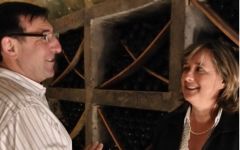
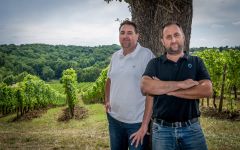
In 1980, Anne Marie, the youngest of the PETIT daughters, gave up her pharmacy studies to come back to the family property.
In 1981, she married Jean Guy Todeschini: a master stone mason by trade, and he gradually came to support her more and more at Mangot.
Until 1989, Anne-Marie and Jean-Guy would share the running of the two family businesses and bringing up their young sons, Karl (born in 1982) and Yann (1984): two budding wine growers…
From 1989 to 1998, they completely transformed the vineyards at Mangot (re-structuring, re-planting, terracing and drainage works) to bring on the quality in leaps and bounds, year after year, and finally obtain the GRAND CRU label for the estate’s 34 hectares.
In 2001, it was the turn of all the buildings to be modernised, a return to his roots for Jean Guy, a stone mason and architect at heart…
From 1996 to 2008, they travelled in France and abroad to promote the new face of Mangot and look for partners.
On top of their boundless energy and capacity for hard work, thanks to their perspective gained outside the wine world, Jean-Guy and Anne Marie have revived and renewed Mangot, restructuring the vineyards and the cellar, with a single goal in mind: Quality.

One of the world’s most classic and popular styles of red wine, Bordeaux-inspired blends have spread from their homeland in France to nearly every corner of the New World. Typically based on either Cabernet Sauvignon or Merlot and supported by Cabernet Franc, Malbec and Petit Verdot, the best of these are densely hued, fragrant, full of fruit and boast a structure that begs for cellar time. Somm Secret—Blends from Bordeaux are generally earthier compared to those from the New World, which tend to be fruit-dominant.

Marked by its historic fortified village—perhaps the prettiest in all of Bordeaux, the St-Émilion appellation, along with its neighboring village of Pomerol, are leaders in quality on the Right Bank of Bordeaux. These Merlot-dominant red wines (complemented by various amounts of Cabernet Franc and/or Cabernet Sauvignon) remain some of the most admired and collected wines of the world.
St-Émilion has the longest history in wine production in Bordeaux—longer than the Left Bank—dating back to an 8th century monk named Saint Émilion who became a hermit in one of the many limestone caves scattered throughout the area.
Today St-Émilion is made up of hundreds of independent farmers dedicated to the same thing: growing Merlot and Cabernet Franc (and tiny amounts of Cabernet Sauvignon). While always roughly the same blend, the wines of St-Émilion vary considerably depending on the soil upon which they are grown—and the soils do vary considerably throughout the region.
The chateaux with the highest classification (Premier Grand Cru Classés) are on gravel-rich soils or steep, clay-limestone hillsides. There are only four given the highest rank, called Premier Grand Cru Classés A (Chateau Cheval Blanc, Ausone, Angélus, Pavie) and 14 are Premier Grand Cru Classés B. Much of the rest of the vineyards in the appellation are on flatter land where the soils are a mix of gravel, sand and alluvial matter.
Great wines from St-Émilion will be deep in color, and might have characteristics of blackberry liqueur, black raspberry, licorice, chocolate, grilled meat, earth or truffles. They will be bold, layered and lush.
